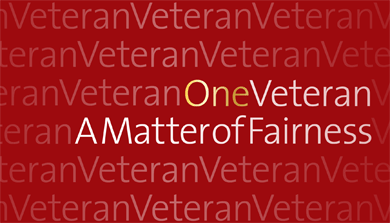Those who sustain similar illnesses or injuries while serving their country should have access to the same benefits, regardless of the nature of their service and where and when they served.
Table of Contents
Contact Information
We encourage former and current members of the Canadian Forces and the RCMP, as well as their family members and other clients of Veterans Affairs Canada, who have questions about their rights or concerns about the benefits and services they receive from the Department to call the Office of the Veterans Ombudsman. We are there to provide information, referrals, and assistance in resolving issues. Each file that we open provides valuable information that helps us identify trends and systemic issues.
Calls within Canada (Toll-free):
1-877-330-4343
Email: info@ombudsman-veterans.gc.ca
Web site: www.ombudsman-veterans.gc.ca
Address: 360 Albert Street, Suite 1560, Ottawa, Ontario K1R 7X7
Letter to the Minister of Veterans Affairs
The Honourable Steven Blaney, P.C., M.P.
Minister of Veterans Affairs
House of Commons
Ottawa, Ontario
K1A 0A6
Dear Minister:
I am pleased to submit to you the 2011–2012 Annual Report for the Office of the Veterans Ombudsman, One Veteran: A Matter of Fairness. The report provides an overview of our operations and activities from April 1, 2011, to March 31, 2012, as well as our priorities for the coming year.
Yours sincerely,
Guy Parent
Veterans Ombudsman
Veterans Bill of Rights
The Veterans Bill of Rights applies to all clients of Veterans Affairs. They include:
- Veterans with war service
- Veterans and serving members of the Canadian Forces (Regular and Reserve)
- Members and former members of the Royal Canadian Mounted Police
- Spouses, common-law partners, survivors and primary caregivers
- Other eligible dependants and family members
- Other eligible clients
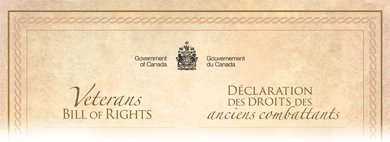
Veterans Bill of Rights
PDF
You have the right to:
- Be treated with respect, dignity, fairness and courtesy.
- Take part in discussions that involve you and your family.
- Have someone with you for support when you deal with Veterans Affairs.
- Receive clear, easy-to-understand information about our programs and services, in English or French, as set out in the Official Languages Act.
- Have your privacy protected as set out in the Privacy Act.
- Receive benefits and services as set out in our published service standards and to know your appeal rights.
You have the right to make a complaint and have the matter looked into if you feel that any of your rights have not been upheld.
The Right Honourable Stephen Harper, P.C., M.P.
Prime Minister of Canada
The Honourable Greg Thompson, P.C., M.P.
Message from the Veterans Ombudsman
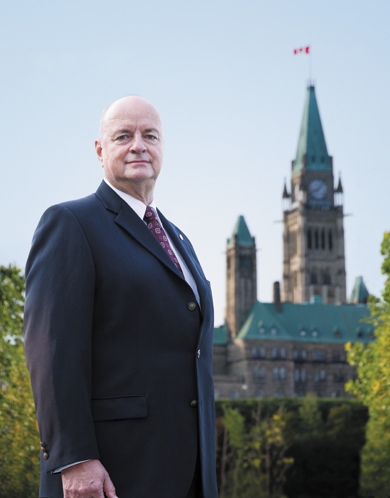
Over the course of the year, I have had the privilege of meeting hundreds of Veterans and members of their families through town halls and other activities across the country, and I am inspired by their courage, deep sense of camaraderie, and loyalty to the country they served.
I recall town halls where Veterans of all ages stood up and applauded each other in acknowledgment of their unity under the One Veteran concept. It seems to me that there is less talk today within the community about what divides Veterans and more emphasis on what unites them. This is a positive development in my view, since it gives credence to the One Veteran theme that guides the work of the Office and encapsulates the conviction that eligibility for benefits and services administered by Veterans Affairs Canada should be based on needs, not on the nature of one’s service and where and when one served. Although the diversity of interests and approaches is to be expected and encouraged in a community as vibrant as the Veterans community, speaking as one on issues of shared concern is important.
Through the day-to-day interaction with Veterans Affairs Canada, my Office resolved many complaints and dealt with issues regarding the fair treatment of Veterans. While there are times where we must agree to disagree, there are also many instances where the Department has moved quickly to address issues brought to its attention. I am pleased, for example, that the Department has adopted the Benefits Browser, an online tool developed by my Office that will make it easier for Veterans and members of the Canadian Forces and the RCMP to determine which services and benefits they may be eligible for and to find all the relevant information in one location. The Minister of Veterans Affairs has been a strong supporter of this tool, and I look forward to its public release.
I have had many frank discussions with the Minister on issues of concern to the Veterans community and the prompt response to the two reports published by my Office this year, namely Veterans' Right to Know Reasons for Decisions: A Matter of Procedural Fairness and Veterans’ Right to Fair Adjudication, is encouraging. While my Office will conduct follow-up reviews to ensure that the measures introduced by the Department and the Veterans Review and Appeal Board fully address the shortcomings identified in the reports, the response to the reports speaks to an openness to consider and act on the recommendations that my Office makes to address issues concerning fair treatment.
I am also encouraged by parliamentarians’ sustained interest in Veterans’ issues, judging from requests received by my Office for briefings and information from Members of Parliament and the motion passed by the House of Commons Standing Committee on Veterans Affairs to review the processes and activities of the Veterans Review and Appeal Board in response to the report Veterans’ Right to Fair Adjudication.
As I reflect on my engagement with Veterans, employees of Veterans Affairs Canada, parliamentarians and Canadians, I am encouraged by the resolve to do right by Veterans. This provides, in my view, a solid foundation to tackle the many challenges and barriers that remain.
I will continue to encourage parliamentarians and senior officials of Veterans Affairs Canada to consider the needs of former and current members of the Canadian Forces and the RCMP through a lens of fairness, in terms of adequacy (Are the right programs and services in place to meet the needs?), sufficiency (Are the right programs and services sufficiently resourced?), and accessibility (Are eligibility criteria creating unfair barriers, and can the benefits and services provided by Veterans Affairs Canada be accessed quickly and easily?).
The concept of fairness will continue to be central in my discussions this year with the Minister of Veterans Affairs, other parliamentarians and the Veterans community, as my Office begins to prepare for the parliamentary review of the changes to the New Veterans Charter brought about by Bill C-55. Bill C-55 contained a clause calling for a review within two years of the enhancements taking effect, which was on October 6, 2011.
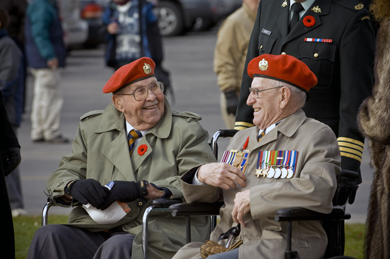
In my opinion, the review should not be limited to an examination of the enhancements brought about by Bill C-55 and I will encourage the Minister and other parliamentarians to broaden the scope of the review to cover critical areas for the successful transition of Canadian Forces members from military to civilian life, namely, financial support, career transition support, and support to families—areas where there are documented deficiencies in terms of adequacy, sufficiency, and accessibility.
While former and current members of the RCMP have needs similar to those of their military counterparts, they do not have access to many of the benefits and programs available to Veterans and serving members of the Canadian Forces. This is an issue that my Office will continue to address, in keeping with the One Veteran theme.
I will also continue to remind all that while the majority of serving men and women leave the service healthy, a great number of them return to civilian life ill or injured. As a nation, we have the obligation to take care of those who served to protect our rights and freedoms. Ensuring that their needs are met is a debt that must honoured.
Guy Parent
Veterans Ombudsman
About the Office

The Swedish word "ombudsman" means "representative of the people." There are 750,000 Veterans in Canada and more than 100,000 still-serving members of the Canadian Forces and the RCMP who one day will join their ranks. Whether or not they receive services and benefits from Veterans Affairs Canada, I consider all of them and their families to be stakeholders of the Office.
Our mandate
The Office of the Veterans Ombudsman works to ensure that Veterans, serving members of the Canadian Forces and the RCMP, and other clients of Veterans Affairs Canada, are treated respectfully, in accordance with the Veterans Bill of Rights, and receive the services and benefits that they require in a fair, timely, and efficient manner.
The Office addresses complaints, emerging and systemic issues related to programs and services provided or administered by the Department of Veterans Affairs, and systemic issues related to the Veterans Review and Appeal Board.
The Office plays an important role in broadening awareness of the needs of Veterans and of the contributions they continue to make to Canadian society when they return to civilian life.
Our approach
The Office functions in accordance with the standards of practice of the International Ombudsman Association, which are also endorsed by the Forum of Canadian Ombudsman, namely, independence, impartiality and neutrality, confidentiality, and informality. These standards govern the way in which the Office receives complaints, works to resolve issues, and makes objective and evidence-based recommendations to the Minister and Veterans Affairs Canada.
The Office is committed to the fair treatment of Veterans and views fairness as an outcome that can be objectively measured in terms of the adequacy, sufficiency, and accessibility of the benefits and services in place to address the needs of ill and injured Veterans and those still in uniform:
- Adequacy:
- Are the right programs and services in place to meet the needs?
- Sufficiency:
- Are the right programs and services sufficiently resourced?
- Accessibility:
- Are eligibility criteria creating unfair barriers, and can the benefits and services provided by Veterans Affairs Canada be accessed quickly and easily?
In regard to eligibility criteria, the Office believes that access to benefits and services should be based on needs. The One Veteran theme encapsulates that conviction and is central to how accessibility issues are viewed by this Office: those with similar illnesses or injuries should have access to the same benefits, regardless of the nature of their service and where and when they served.
Who we serve
The Office stands ready to help members of the Veterans community, serving members of the Canadian Forces and the RCMP, and other clients of Veterans Affairs Canada:
- Veterans of the Second World War and the Korean War
- Veterans of the Canadian Forces (Regular Force and Reservists)
- Serving members of the Canadian Forces (Regular Force and Reservists)
- Veterans of the RCMP
- Members of the RCMP
- Immediate family members and caregivers of any of the above-mentioned groups
- Survivors of Veterans of the First World War
- Former members of the Canadian Forces who did not complete basic training and who have service-related medical conditions.
Our services
The Office provides four main services:
- Information:
- Frequently, those who call the Office are unaware of the benefits, services, and redress mechanisms available to them. The Office helps them navigate the complexity of the system by providing information about their rights and about the benefits and services provided by Veterans Affairs Canada and other organizations.
- Referrals:
- The Office assists those who call for help, often as a last resort, by facilitating referrals to service providers that can best assist them.
- Complaint resolution:
- The Office addresses complaints from individuals who believe they have been treated unfairly by Veterans Affairs Canada or other service providers. To bring closure as quickly as possible, every attempt is made to resolve complaints informally and at the lowest level possible, most often through inquiries and mediation with service providers.
- Interventions to address systemic issues:
- When the facts of a case raise systemic issues that can potentially affect many other Veterans and clients of the Department, when there are multiple complaints about the same issue, or when issues emerge as a result of the Office’s interaction with the Department and the Veterans community, the Office will intervene using various approaches based on the nature and complexity of the issue:
- Simple procedural issues, for example, are discussed informally with the Department to bring resolution as quickly as possible. A telephone call or an exchange of correspondence is often all that is required to bring about change.
- The Office undertakes reviews that summarize the information available on a particular topic as well as the various points of view. Review papers, which do not contain recommendations, are produced for the purpose of facilitating informed discussion of issues of concern to the Veterans community.
- Complex issues may require thorough investigation, leading to a formal report with recommendations to the Minister. These reports are published 60 days after submission to the Minister.
Communications and outreach
Communications are central to the work of the Ombudsman to not only inform and educate, but also to learn, encourage dialogue, and bring about change. The Office uses a variety of means to promote discussion with the Veterans community, to ensure that Veterans’ concerns are reflected in the work of the Office, and to engage parliamentarians and other decision-makers on Veterans’ issues.
Communications and outreach activities are carried out:
- to enhance awareness and understanding of the Veterans Ombudsman’s role and mandate;
- to raise awareness among Veterans and other clients of Veterans Affairs Canada of the services provided by the Office;
- to increase understanding of Veterans’ issues and foster informed dialogue about them; and
- to promote and build support among legislators and senior officials of Veterans Affairs Canada for the Ombudsman’s recommendations to advance the issues of fairness.
It is also a communications priority to raise awareness of the valuable contributions that Veterans and the more than 6,000 men and women who retire every year from the Canadian Forces and the RCMP continue to make to society after service to their country.
Structure of the Office
The Ombudsman is supported by a team of 37 employees located in Ottawa and Charlottetown, including service representatives, early intervention analysts, investigators, communicators, a legal advisor, a policy advisor, and administrative support staff. The team includes former members of the Canadian Forces and the RCMP, as well as experienced public servants, who use their knowledge and expertise to level the playing field by helping Veterans and other clients of Veterans Affairs Canada navigate the established processes.
The Ombudsman also relies on an Advisory Committee for advice on matters of concern to the Veterans community and to foster cooperation among Veterans’ groups and increased dialogue between the Veterans community and the Office.
Organizational chart
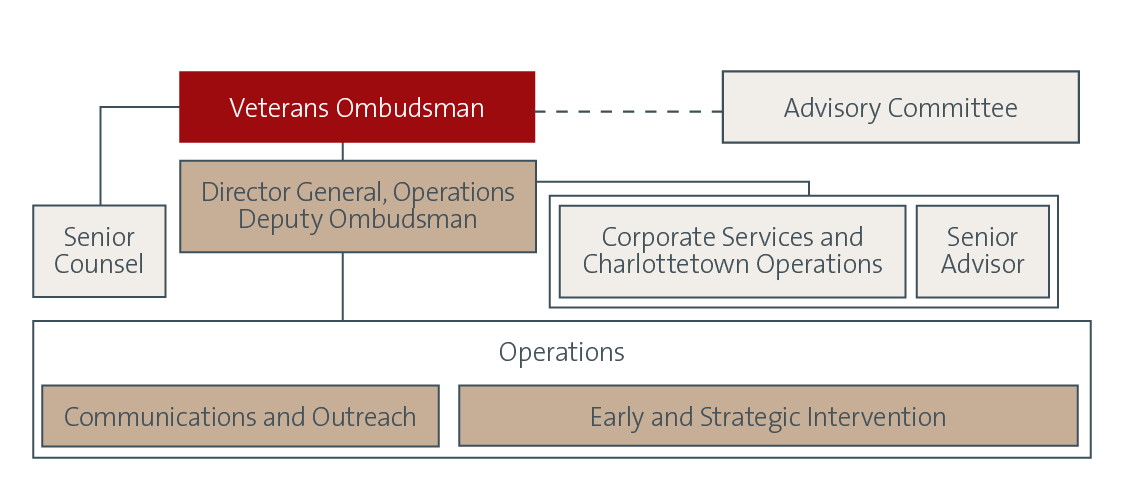
Veterans Ombudsman
- Director general, Operations / Deputy Ombudsman
- Operations
- Communications and Outreach
- Early Intervention
- Research and Investigations
- Corporate Services and Charlottetown Operations
- Senior Advisor
- Operations
- Senior Counsel
The Year in Review: 2011–2012
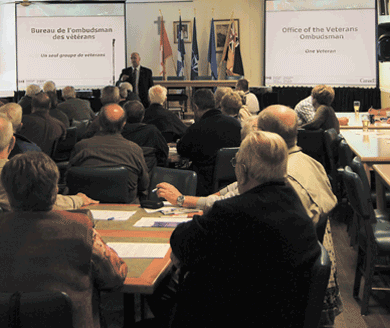
During the year, I met hundreds of Veterans who inspired me with their courage, deep sense of camaraderie, and loyalty to the country they served. It was very meaningful for me to see Veterans of all ages applaud each other during town halls in acknowledgment of their unity under the One Veteran concept. It seems to me that there is less talk today within the Veterans community about what divides Veterans and more emphasis on what unites them. Despite the expected diversity of interests, speaking as one on key issues of shared concern is important.
Individual cases
Throughout 2011–2012, the Office of the Veterans Ombudsman continued to provide assistance through early interventions, receiving more than 7,000 calls, emails, and letters.
The Office began the year with 231 cases carried over from the previous year and opened 1,547 new cases. A total of 1,602 cases were closed during the year, leaving 176 cases still in progress on March 31, 2012.
Service representatives and early intervention analysts provided information, referrals, and assistance in resolving complaints in 71% of cases. Of the remaining cases (29%), 17% were closed without further intervention by the Office because there were no errors made by Veterans Affairs Canada and complainants, while not satisfied with decisions made by the Department, were treated fairly. Cases closed without resolution (12%) dealt with issues that fall outside the mandate of the Office or require changes to legislation. Many of the latter cases form the basis of reviews, investigations, or sustained efforts by the Office (refer to section Trends and issues identified through individual cases).
Disposition of the 1,602 cases closed during 2011–2012
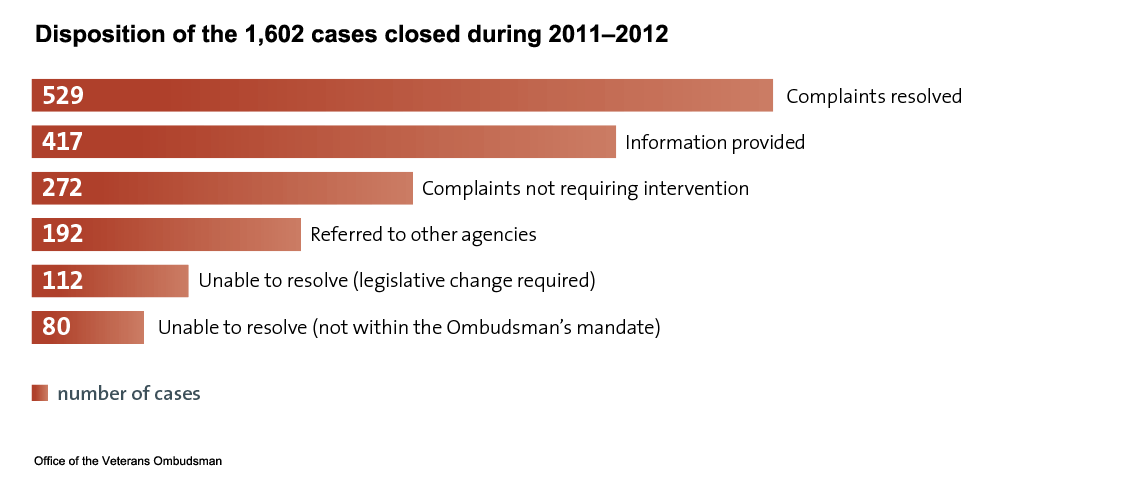
| Issue | Number of cases |
|---|---|
| Complaints resolved | 529 |
| Information provided | 417 |
| Complaints not requiring intervention | 272 |
| Referred to other agencies | 192 |
| Unable to resolve (legislative change required) | 112 |
| Unable to resolve (not within the Ombudsman’s mandate) | 80 |
The majority of new cases pertained to the following:
- Health care benefits (including denial of treatment benefits, concerns about the approval process and turnaround times for reimbursement, interpretation of policies and regulations)
- Disability pensions and awards (including concerns about decisions made by the Department and turnaround times, decision letters)
- Veterans Review and Appeal Board (including decisions pertaining to disability pensions/awards and process-related issues)
- Veterans Independence Program (including eligibility, application and appeal processes, concerns about turnaround times, level of financial support, interpretation of policies and regulations)
- New Veterans Charter (including eligibility and case management issues, issues pertaining to the Rehabilitation Program and the Earnings Loss Benefit)
- Issues external to Veterans Affairs Canada (including issues under provincial jurisdiction or pertaining to the Canadian Forces, including concerns about the Service Income Security Insurance Plan [SISIP LTD])
- Agent Orange ex gratia payment (including denied payment, application deadline)
Main issue areas - 74 percent of all 1,547 new cases
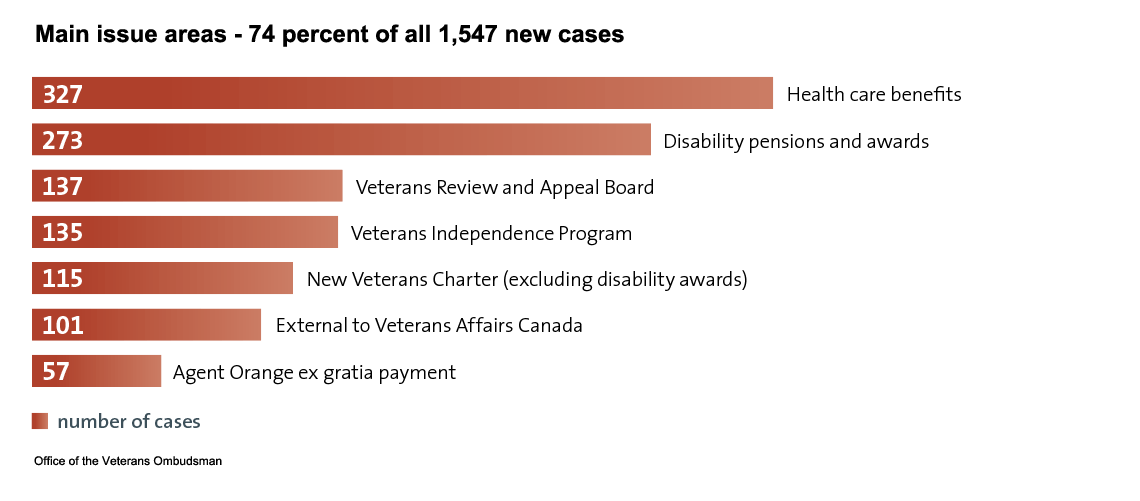
| Issue | Number of cases |
|---|---|
| Health care benefits | 327 |
| Disability pensions and awards | 273 |
| Veterans Review and Appeal Board | 137 |
| Veterans Independence Program | 135 |
| New Veterans Charter (excluding disability awards) | 115 |
| External to Veterans Affairs Canada | 101 |
| Agent Orange ex gratia payment | 57 |
As in past years, the majority of new cases were brought to the Office by former and serving members of the Canadian Forces (Regular and Reserve Forces) and by traditional Veterans (Veterans of the Second World War and the Korean War).
Service profile
1,167 clients
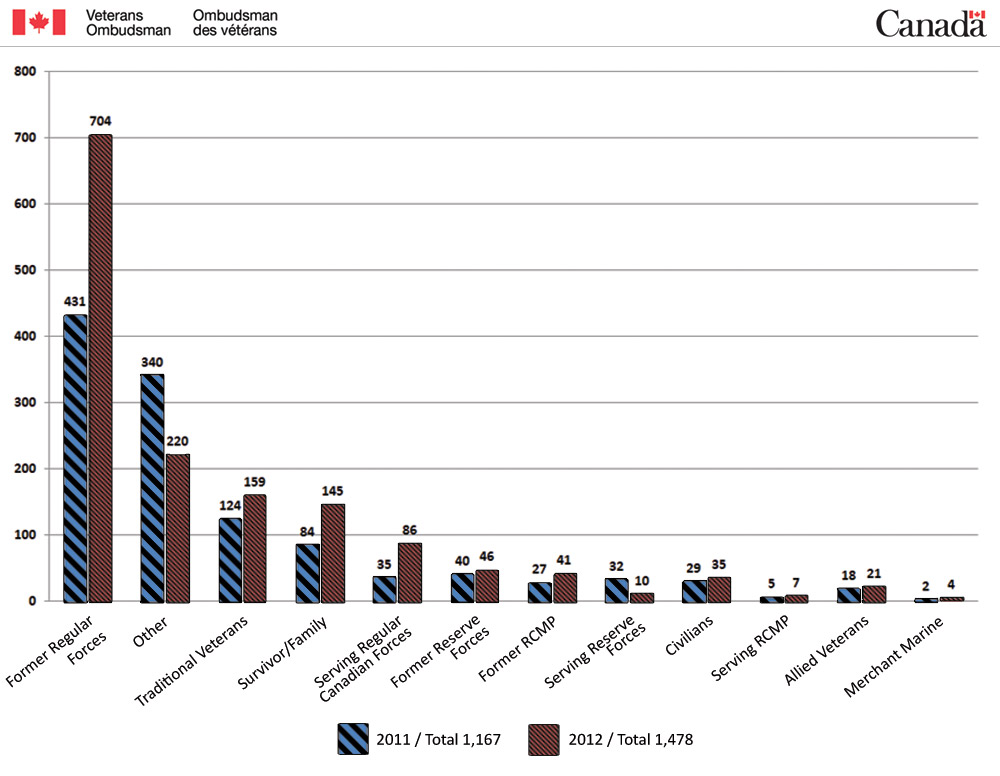
| Service Profile | Percentage |
|---|---|
| Footnote * Former members of the Canadian Armed Forces | 44% |
| Footnote * Serving members of the Canadian Forces (Regular Force) | 4% |
| Footnote ** Traditional Veterans | 13% |
| Allied Veterans | 2% |
| Former and Serving Members of the Reserve Force | 7% |
| Former and Serving Members of the RCMP | 4% |
| Survivors / Family Members | 8% |
| Civilians | 2% |
| Unknown | 16% |
The largest number of cases originated in Ontario and the Western Region (Alberta and British Columbia), followed by the Atlantic Region and Quebec.
Geographic profile - 1,167 clients
Geographic profile 1,167 clients
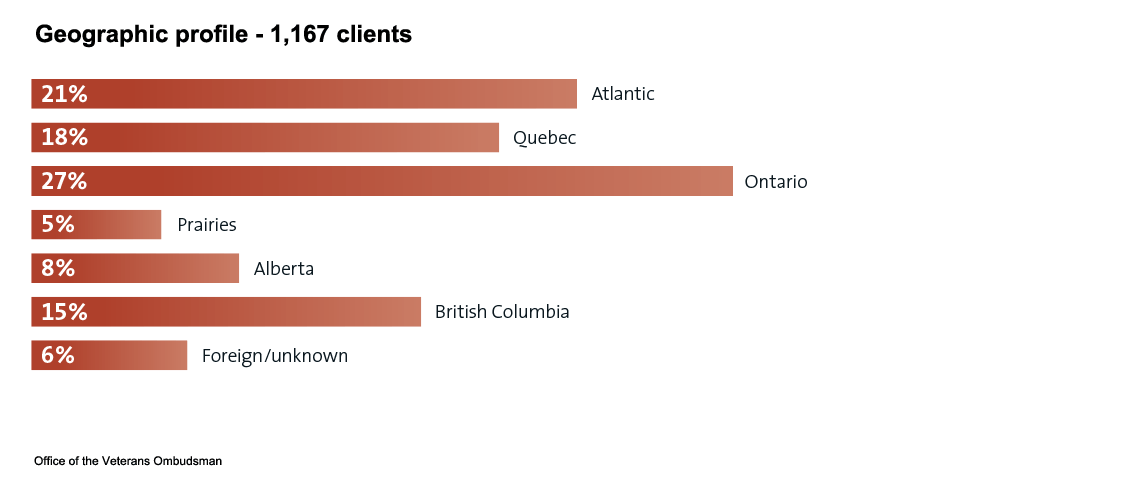
| Geographic location | Percentage of clients |
|---|---|
| Atlantic | 21% |
| Quebec | 18% |
| Ontario | 27% |
| Prairies | 5% |
| Alberta | 8% |
| British Columbia | 15% |
| Foreign/unknown | 6% |
Trends and issues identified through individual cases
By working on individual cases, the early intervention team identifies issues that can affect many more Veterans and serving members of the Canadian Forces and the RCMP. The Office engages Veterans Affairs Canada to resolve issues that create unfair barriers to accessibility or raise questions about the adequacy and sufficiency of the benefits and services provided by the Department.
One call to the Office helps 600 Veterans get $14 million in retroactive payments
Last year, we reported on the case of a Veteran who called the Office about his eligibility for the Exceptional Incapacity Allowance, an allowance of up to $1,348.57 a month provided to pensioners who are exceptionally incapacitated. The Office contacted Veterans Affairs Canada to discuss the case and found that half of the 1,800 Veterans who were potentially eligible for the Allowance had not been informed. The Department quickly corrected the situation by sending a letter to those Veterans. As a result, close to 600 Veterans were found to be eligible and received retroactive payments totaling $14 million.
Below are other examples of issues that have been resolved or are currently being pursued with the Department:
Caregivers denied the Agent Orange ex gratia payment get satisfaction
The Office addressed a number of complaints from individuals who were denied the Agent Orange ex gratia payment, which ended on December 30, 2011. The Office felt that the Department’s narrow definition of caregiver was at odds with the intent and spirit of the Order in Council that established the ex gratia payment. After months of back-and-forth discussions, the Department reviewed claims that had been denied in the past and, as a result, some 70 applicants, including caregivers, received the $20,000 ex gratia payment.
Severely injured Veterans are now better informed about their potential eligibility for the Permanent Impairment Allowance and Supplement
The Office found that the Department was using entitlement to the Earnings Loss Benefit as the only means to track Veterans who could be eligible for the Permanent Impairment Allowance (PIA) and the Permanent Impairment Allowance Supplement (PIAS), two monthly benefits, payable for life, to compensate for lost job opportunities. When we pointed out that some Veterans may be eligible for the PIA and the PIAS without receiving the Earnings Loss Benefit, the Department looked into the matter and identified close to 350 Veterans for whom this was the case. The Department corrected the situation by sending a letter informing these Veterans of their potential eligibility.
Process to request the extension of health treatment benefits is no longer causing difficulties
Veterans Affairs Canada provides coverage for the services provided by licensed health professionals, such as massage therapy and physiotherapy. While the Department introduced a new policy in January 2010 with the intent of providing greater flexibility and reducing red tape in the administration of the program, including the processing of requests for extension of treatment benefits, the Office continued to receive complaints.
At the request of the Office, the Department investigated the issue and found that the policy was not applied consistently across district offices and treatment authorization centres. A program directive was issued in September 2011 to rectify the situation. Since then, the Office has not received complaints about this issue.
Survivors will be better informed about changes to their benefits
When a Veteran passes away, the survivor, in most cases the spouse or common-law partner, continues to receive the Veteran’s pension for one year. After that time, he or she receives a survivor’s pension, which can be substantially less. Last year, the Office noticed that not all survivors were receiving advance written notice of the reduction of their pension benefits, which was creating confusion and financial hardship.
Veterans Affairs Canada has informed the Office that starting in the fall of 2012, all survivors will receive a condolence letter that clearly explains when and how benefits will change. The Department is also considering the possibility of sending a second letter two months before the changes to benefits take effect. The Office will monitor the situation.
Letters denying requests for treatment benefits fail to inform Veterans of their appeal rights and provide reasons for decisions
The Office dealt with a number of cases where Veterans received letters from the Department’s Treatment Authorization Centres informing them that their requests for health treatment benefits were denied without providing information about their appeal rights. Only those Veterans who requested a reconsideration of the decision after receiving the first letter got a second letter explaining the appeal process. Veterans who did not pursue the matter were left uninformed about their rights.
Last year, we found that letters sent to Veterans to inform them that their requests for health treatment benefits were denied did not always explain how and why the decision was made. The Department has recognized the limitations and is currently reviewing the process to produce letters. The Office will continue to engage the Department on this issue to ensure that all decision letters issued by the Treatment Authorization Centres contain reasons for decisions and information about appeal rights. The same deficiencies were identified in letters issued by the Department to inform applicants of its decisions pertaining to their application for disability pensions or disability awards and discussed in the Ombudsman’s report entitled Veterans’ Right to Know Reasons for Decisions: A Matter of Procedural Fairness.
Reimbursement rates for treatment benefits are not keeping pace with actual costs
In resolving a complaint from a Veteran who could not get full reimbursement for blood collection services he required while in the hospital, the Office noted that there were gaps between the reimbursement rates and the actual costs for this and other treatment benefits listed in the Department’s Benefit Grids. These grids are the tool used by the Department to determine which treatment benefits will be authorized, under what conditions, and the reimbursement and frequency limits. The Department acknowledged that the process used to update the grids causes delays and is working to put in place a more efficient mechanism to keep track of rate updates issued by the provinces, regulating bodies, and service providers, and to adjust the grids in a timelier manner. The Office will continue to monitor the situation.
Veterans on waiting list for “contract" beds are being passed over
Veterans Affairs Canada has contracts with several long-term care facilities across Canada to give eligible Veterans priority access to beds (contract beds). The Department currently has arrangements for 2,659 beds with 160 facilities across the country. In instances where a “contract bed" is available in a facility but there are no Veterans on the waiting list, the provincial health authority will make the bed available to a civilian. However, it has come to the attention of the Office that there have been instances where a Veteran was on a waiting list for a “contract bed" but the bed was made available to a civilian who was felt to be more in need by the provincial health authority. The Office will pursue this matter with the Department.
Policy requiring allied Veterans to supply form T124 as proof of service with the British Forces during the Second World War is unfair
For purposes of establishing service eligibility as a former member of the Royal Navy, the Department requires former members of the British Mercantile Marine to provide T124 agreements, an enlistment-like document. The Office found that T124 agreements were not necessarily kept by the British National Archives after the war, nor was the form always used to enlist sailors. In February 2011, the Veterans Review and Appeal Board overturned a departmental decision in the case of a Veteran who was denied benefits because he was unable to provide the T124 even though he had other proof of service. Through its interpretation of the War Veterans Allowance Act, the Board found no requirement for former members of the British Merchant Navy to establish themselves as former members of the Royal Navy in order to meet the definition of an “Allied Veteran". The Department is engaged with the Office on this issue and is reviewing its policy on form T124. The Office will monitor the situation.
Is the Department becoming less flexible by no longer considering valid reasons for late requests?
Veterans who get treatments (e.g., massage therapy, physiotherapy) for a condition for which they have a disability pension or award have 18 months from the date the eligible treatment expense was incurred to request reimbursement. The Department may waive the 18-month limitation if there are extenuating circumstances or if the delay was caused by an administrative error. A similar provision exists for the retroactive eligibility for the Treatment Allowance, a payment provided under the Pension Act to those who require acute care for a pensioned condition during periods of hospitalization or on an out-patient basis.
The Office is working on the case of a Veteran who required several surgeries over a number of years for his pensioned condition. He contacted the Department for various reasons following some of these surgeries but was only informed of his eligibility for the Treatment Allowance during one of his more recent conversations with a departmental employee. The Veteran did receive the treatment allowance for his last two surgeries but was denied the allowance for his previous surgeries on the grounds that there were no extenuating circumstances that would justify waiving the 18-month limitation on retroactive eligibility. A note on the client’s file also refers to a new directive “indicating that there are no circumstances under which the 18 month time limit can be waived."
The Office will pursue this matter to clarify the policy on retroactivity and will strongly encourage the Department to continue to waive the 18-month time limit in cases where the delay is attributable to extenuating circumstances or an administrative error by the Department, including the failure to inform Veterans of their eligibility for benefits and services.
Process to authorize treatment benefits for consequential conditions fails Veterans in need of urgent treatment and creates inequity between disability pensioners and disability award recipients
When an injured Veteran requires treatment for a disability that is a consequence of a condition (referred to as a consequential condition) for which he or she has a disability pension under the Pension Act or a disability award under the New Veterans Charter, the Department’s policy requires the Veteran to first submit a new application for a disability pension or award for the consequential condition. If the application is successful—a process that can take more than 16 weeks—the Veteran will then be able to receive health treatment benefits for the consequential condition.
The Office is seized with cases that show the inadequacy of this process. In one instance, the Veteran who has a pension for an injury to his ankle fell and damaged his dentures. The Department initially refused to cover the cost of new dentures on the grounds that it was not related to his pensioned condition (the only condition for which he receives a pension is related to his injured ankle), but agreed to do so after the Office intervened.
In a second case, the Veteran who received a disability award for a lower back condition sustained broken teeth as a result of a fall. The Department refuses to pay for the dental work and encouraged the Veteran to apply for a disability award for the damage to his teeth. Even if he did submit an application and received a favourable decision, he would be reimbursed for dental treatment expenses on a go-forward basis only since the New Veterans Charter does not allow for retroactivity.
The Office of the Veterans Ombudsman is of the view that changes to the policy are required to better address situations where one-time treatment is all that is needed for a consequential injury (i.e. repairing broken teeth in the second example) and situations where it would not be possible to get a disability pension or award for the consequential injury (i.e. damaged dentures is not a medical condition).
The process also creates inequity between disability pensioners and disability awards recipients, an issue best explained with an example. A Veteran under the Pension Act who applies on June 1 for a disability pension and receives a favourable decision on August 31 could get reimbursed for treatment expenses incurred from March 1 onward, that is, 90 days prior to the date of application. A Veteran under the New Veterans Charter could only get reimbursed for treatment expenses incurred after the decision to grant a disability award is made, in this case, expenses incurred after August 31. The issue of retroactivity was first raised by the Veterans Ombudsman in last year’s annual report and in his report Veterans’ Right to Fair Adjudication,.
Are children of deceased Veterans being unfairly denied financial support for education?
The Education Assistance Program provides financial assistance for post-secondary education to children of Veterans and members of the Canadian Forces who died as the result of military service or were receiving a disability pension or award of 48 percent or greater at the time of death.
The Office has dealt with a few cases of children of deceased Veterans who found out about the program after completing their education and were denied retroactive reimbursement of their education costs.
While the policy guiding the administration of the program clearly states that funding is on a “go-forward" basis only, there is nothing in the Children of Deceased Veterans Education Assistance Act and related regulations preventing retroactive reimbursement of education expenses. Is the policy overly restrictive? Is it at odds with the intent and spirit of the legislation? Those are questions that the Office is discussing with the Department to ensure that surviving children are treated fairly.
Interventions on major files
While resolution of individual cases is an important activity for the Office, considerable effort was made on issues of importance to the Veterans community.
Improved communications with Veterans and other clients of the DepartmentUnder the current regime, the onus is on Veterans to self-identify and make their needs known to Veterans Affairs Canada. Lack of knowledge is a significant barrier to accessibility to the Department’s programs and services. One family, featured in the selected case summaries section of this report, paid dearly for their lack of knowledge: 70 years without a disability pension and survivor benefits! For this reason, the Veterans Ombudsman feels strongly that the Department must implement a robust communications and outreach program targeted not only at its current clients, but also at the broader Veterans community.
Many of the cases that the Office has dealt with over the year point to deficiencies in the Department’s day-to-day communications. Spouses of deceased Veterans unaware of changes to their benefits, severely injured Veterans unaware of their potential eligibility for the Permanent Impairment Allowance, and clients not informed about their appeal rights are a few examples. The impact on Veterans and their families is significant in terms of their well-being and financial security: for 600 Veterans unaware of their eligibility for the Exceptional Incapacity Allowance, the cost was $14 million.
The Office has brought many communications issues to the Department’s attention during the year. Although the Ombudsman is encouraged by the Department’s willingness to bring about improvements, much more is needed in that area, given that access to benefits and services is governed by complex policies and eligibility criteria that make it difficult for Veterans and their representatives to understand what is available to them. As a result, many feel vulnerable and ill-prepared to discuss their needs with the Department.
Last year, the Ombudsman reported on the Benefits Navigator, an interactive visual tool created by the Office. The tool provides a visual representation of the benefits to which an individual may be eligible based on his or her own circumstances and provides easy access to all the relevant information. The Department has adopted the tool, now called the Benefits Browser, and has done much work to improve its functionality. The Benefits Browser has been successfully deployed within the Department to help employees better address the needs of Veterans. Plans are now in the works to make the Benefits Browser available to Veterans and other clients of the Department.
Transformation agenda
As many of the changes made by Veterans Affairs Canada under its transformation agenda are recent, it is too early to determine if they are achieving the desired results. Therefore, the Office will continue to monitor the Department’s efforts to improve service delivery and better meet the changing needs of the Veteran population, and will support changes that result in improvements to programs and services in terms of adequacy, sufficiency, and accessibility.
It has been the position of the Veterans Ombudsman that any economies resulting from increased efficiencies in process should be redirected to areas that are underfunded. For example, in a statement released to the media on December 5, 2011, calling on Veterans Affairs Canada to implement changes to the Funeral and Burial Program, the Ombudsman expressed the view that “it is ironic that, on the one hand, Veterans Affairs Canada has said that they are able to reduce their budget as a result of a decline in their client base, and yet there are clearly underfunded programs, like the Funeral and Burial Program, that are not sufficiently resourced to meet the needs of Veterans and their families."
Reduction in departmental spending
Leading to the federal budget tabled on March 29, 2012, the Veterans Ombudsman took every opportunity to publicly request that Veterans Affairs Canada be exempt from the Government’s plan to reduce departmental spending. For example, during his March 8, 2011 appearance before the House of Commons Standing Committee on Veterans Affairs, he reminded Committee members that “payments made to Veterans or their family members are not handouts or welfare benefits but remittance of a debt incurred by the Government of Canada, who agreed to compensate citizens who choose military or federal police service as a career." The Ombudsman went on to say that “there must be a guarantee that sufficient resources, both human and monetary, will be there to support programs."
Part-time reservists
The Veterans Ombudsman has also used every opportunity to raise the issue of the differential treatment of reservists with senior officials of the Department, the Minister of Veterans Affairs, parliamentarians, and the Chief Military Personnel of National Defence, and will continue to do so.
In the Office’s response to the proposed regulatory amendments to the Canadian Forces Members and Veterans Re-establishment and Compensation Regulations for Bill C-55 and the Earnings Loss Benefit, and again when the amended regulations came into effect on October 6, 2011, the Veterans Ombudsman reiterated his position that part-time reservists were treated unfairly. In his October 6, 2011 statement to the media, the Ombudsman qualified as “good news" the fact that the Earnings Loss Benefit was now set at a minimum of $40,000 pre-tax per year, pointing out, however, that the minimum annual income of $24,300 for part-time reservists was unfair “given that part-time service can result in permanent disability directly related to service. A part-time reservist’s needs for rehabilitation and income support are not different than those of a Regular Force member."
In his remarks to the Members of the House of Commons Standing Committee on Veterans Affairs on March 8, 2012, the Ombudsman again raised the issue by asking Committee members “to address the unfair issue of differential treatment of reservists under the provisions of the Earnings Loss Benefit. I firmly believe that those who sustain similar illnesses or injuries while serving their country should have access to the same benefits, regardless of the nature of their service and where and when they served. It’s a matter of fairness and I ask for the Committee’s support in this matter."
Investigations
Investigation priorities were realigned during the year in order to focus attention on procedural fairness issues related to the adjudication process. Although the investigation team continued to work on a number of other areas of importance to Veterans, including mental health, long-term care, and the Veterans Independence Program, the reports detailing the findings will be released in fiscal year 2012–2013.
The Ombudsman released the first two of four reports to be published on issues of procedural fairness.
Veterans’ Right to Know Reasons for Decisions: A Matter of Procedural Fairness
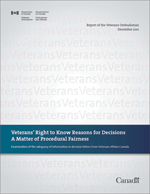
On February 20, 2012, the Ombudsman released his report entitled Veterans' Right to Know Reasons for Decisions: A Matter of Procedural Fairness. The report examined the adequacy of information provided by Veterans Affairs Canada in its decision letters to Veterans who apply for disability pensions or disability awards.
Veterans have a right to know why and how decisions that affect them are made. Providing reasons in decision letters is fundamental to procedural fairness and is a statutory requirement under both the Pension Act and the Canadian Forces Members and Veterans Re-establishment and Compensation Act. The Office reviewed a statistically valid sample of letters sent by the Department between 2001 and 2010 and found that most letters did not provide an adequate explanation of how the decisions were made.
Shortly after the release of the report, the Minister of Veterans Affairs announced measures to improve information contained in the Department’s decision letters, based on the recommendations made by the Veterans Ombudsman.
The Office will conduct a follow-up review in the fall of 2012 to ensure that the changes made to the Department’s letters fully address the shortcomings identified in the Ombudsman’s report.
Veterans’ Right to Fair Adjudication
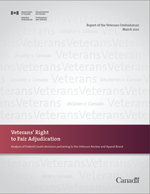
Veterans’ Right to Know Reasons for Decisions, the Veterans Ombudsman submitted to the Minister of Veterans Affairs his report entitled Veterans’ Right to Fair Adjudication, an analysis of Federal Courts’ decisions pertaining to the Veterans Review and Appeal Board.
The Veterans Review and Appeal Board has a critical role to play in ensuring that Veterans and other clients of Veterans Affairs Canada receive the benefits to which they are entitled by determining whether the laws governing the disability benefits program have been properly applied by the Department at the adjudication level and by providing applicants the opportunity to present additional evidence in support of their application. Given its role as an independent appeal tribunal, the Board must be held to a higher standard of review and procedural fairness than the Department. The degree to which the Board adheres to these standards by rendering decisions in compliance with the Veterans Review and Appeal Board Act has been the source of much concern within the Veterans community.
Through their decisions, the Federal Court and the Federal Court of Appeal provide an independent judicial assessment of the manner in which questions of law, fact, and procedural fairness were handled in cases before them. For this reason, the Veterans Ombudsman determined that an analysis of Federal Courts’ judgments pertaining to Board decisions would provide valuable information about the degree to which the Board adheres to high standards of review and procedural fairness. The services of the law firm of Borden Ladner Gervais LLP (BLG) were retained to perform an independent analysis of the 140 Board decisions that have been challenged to the Federal Court and the 11 decisions that were subsequently appealed to the Federal Court of Appeal. The review was conducted in the fall of 2011.
In 60 percent of the 140 Board decisions reviewed by the Federal Court, the Court ruled that the Board erred in law or fact, or failed to observe principles of procedural fairness. The failure to liberally construe the provisions of the Veterans Review and Appeal Board Act, to accept credible uncontradicted evidence, to give the benefit of the doubt, and to accept credible new evidence pertain to the Board’s failing to allow the latitude granted to it by its enabling legislation. The failure to ensure procedural fairness by not providing sufficient reasons for decisions or not disclosing medical evidence considered by the Board further undermines the rights of Veterans and the credibility of the Board.
Shortly after the release of the report, the Veterans Review and Appeal Board announced measures to address the Ombudsman’s recommendations. In addition, the House of Commons Standing Committee on Veterans Affairs passed a motion calling for a review of the processes and activities of the Board. The Office will conduct a follow-up review in fiscal year 2012–2013 to ensure that the changes made by the Board fully address the shortcomings identified in the Ombudsman’s report.
Communications and outreach
The Veterans Ombudsman participated in various outreach activities during the year to remain close to those he represents, to better understand the various points of view in the Veterans community, and to enhance the overall awareness and understanding of his role and mandate.
Town hall meetings were held in Quebec City, Quebec; Oromocto and Moncton, New Brunswick; Halifax, Nova Scotia; Sudbury and Timmins, Ontario; Surrey and North Vancouver, British Columbia; and Moose Jaw, Regina, and Saskatoon, Saskatchewan. In addition to town hall meetings, the Ombudsman met with representatives of organizations providing services to Veterans, families and staff of Military Family Resource Centres, residents and staff of long-term care facilities, and employees of Veterans Affairs Canada in regional and district offices and at headquarters in Charlottetown, Prince Edward Island.
It was also a priority for the Ombudsman to reach out to provincial ombudsman and municipal elected officials to discuss ways they can provide assistance to ill and injured Veterans and to raise awareness of the immense contribution that Veterans and the more than 6,000 men and women who retire every year from the Canadian Forces and the RCMP continue to make to society after service to their country.
Engaging parliamentarians and other decision makers on Veterans’ issues remained a priority. In addition to appearances before parliamentary committees, the Ombudsman’s reports were broadly disseminated to all Members of Parliament. The Ombudsman’s outreach initiatives, speaking engagements and reports were also widely reported on by local, regional and national media, which further raised public awareness of the needs of Veterans.
Efforts were also made to improve the accessibility and functionality of the Web site and to make greater use of social media as a means to inform Veterans across the country and gather feedback from them in real time.
Corporate initiatives
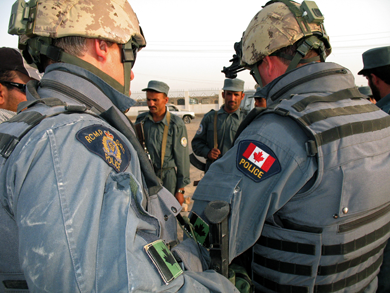
A number of initiatives were undertaken during the year to enhance the services and support the Office provides to the Veterans community and other clients of Veterans Affairs Canada.
The Office improved organizational effectiveness and efficiency:
- by strengthening its governance structure as well as its management and operational processes, including improvements to records and information management and the implementation of a new call centre solution;
- by focusing on the recruitment, retention, and training of qualified employees, including the design of a professional development program; and
- by seeking and obtaining from the Minister of Veterans Affairs delegation, under section 73 of the Privacy Act and section 73 of the Access to Information Act, to process internally all access to information and privacy requests dealing specifically with the Office of the Veterans Ombudsman.
In addition, the Veterans Ombudsman Advisory Committee was restructured to support a new approach and to ensure that a broad range of views and experiences are reflected on the Committee. The Committee consists of the Chair, six military Veterans’ representatives, one RCMP Veteran, and three professional advisors in fields of relevance to the work of the Office. There are also affiliate members who provide advice to the Ombudsman on a needs basis.
The Committee, which met on two occasions during the year, plays an important role in helping the Office select issues for systemic review and assess the impact of changes proposed by Veterans Affairs Canada to programs and services.
Selected case summaries
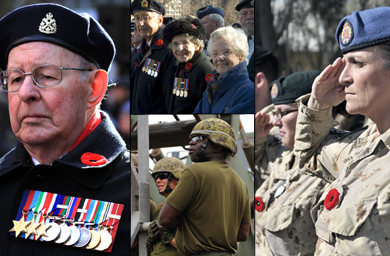
What is the cost of not being informed? For this family, it was 70 years without a disability pension and survivor benefits!
The son of a Veteran who passed away in 1980 contacted the Ombudsman’s Office with questions about the Books of Remembrance. In the course of the discussion, the Office representative found out that the Veteran, who survived two plane crashes, was medically released from the Royal Canadian Air Force in 1942. He never applied for benefits. With counsel from the Office, the son helped his mother file an application for a post-mortem disability pension. The Department rendered a favourable decision and, as a result, the Veteran’s wife is now receiving a survivor’s pension.
Too late for this Veteran in need of a ramp
In September 2011, a departmental occupational therapist recommended a wheelchair and ramp for this Veteran of the Second World War. A few weeks later, the Veteran received a letter from the Department authorizing the purchase of the wheelchair. After waiting four months for a decision in regard to the ramp, during which time the Veteran relied on family and friends to carry him up and down the steps to his home, he called the Office for assistance. The Office intervened, and within three weeks the Department gave its authorization for the ramp. Sadly, the Veteran passed away a few days after receiving the approval.
Reimbursement of physiotherapy treatments denied for two years
The Department authorized physiotherapy treatments for this Veteran as part of her rehabilitation plan but denied her request for additional sessions two years in a row, even though she provided medical opinions confirming the need for additional treatments. She appealed the decisions without success and contacted the Office for assistance. If the Veteran had not participated in the Rehabilitation Program, the Department would have considered her requests for additional physiotherapy sessions under the Health Care Benefits Program, where different criteria are used.
The Office pointed out to the Department that the Veteran's requests would likely have been approved under the Health Care Benefits Program. After considering this, the Department agreed to reimburse the Veteran for the additional physiotherapy sessions and provided policy direction to staff to avoid similar situations in the future.
89-year-old Veteran can’t get reimbursed for a meal taken outside “regular meal hours"
The daughter of a Veteran called the Office after the Department denied her mother’s claim for reimbursement of a $14.15 meal on the grounds that she had lunch outside “regular meal hours." She explained that her mother was required to fast in preparation for minor surgery that morning and had lunch earlier than usual after the surgery. The Office contacted the Department and the issue was quickly resolved, avoiding the need for a formal appeal of the decision.
Veteran unable to provide a medical report loses his Earnings Loss Benefit and access to the Rehabilitation Program
This Veteran was in financial distress when he called the Office for assistance. He had been trying for six months without success to get the Department to reinstate his Earnings Loss Benefit and access to the Rehabilitation Program. The issue was that he was unable to book an appointment with a specialist to obtain the medical report required by the Department.
The Office contacted the Department and a case manager was assigned to do a complete review of the Veteran’s case. The case manager found that there was sufficient medical information on file pending the specialist’s report to reinstate his benefits with retroactivity and was also looking into the Veteran’s eligibility for others benefits, including the Permanent Impairment Allowance.
Improved health care benefits for this Canadian Forces Veteran
Ombudsman service representatives always take the time to review callers’ circumstances to determine if they are receiving all the benefits and services to which they are entitled.
This Veteran was receiving health care benefits for his pensioned condition as well as support through the Veterans Independence Program (VIP). The Office representative noted that the Department had not recorded in the Veteran’s file the fact that his need for VIP services was related to an injury sustained while serving in a special duty area. This important omission was quickly corrected by the Department when it was brought to its attention. As a result, the Veteran now has access to health care treatment benefits for his pensioned condition and all other health needs that he may have in the future (e.g., glasses, hearing aids, dental services).
Looking Ahead: 2011-2012

I will continue to encourage parliamentarians and senior officials of Veterans Affairs Canada to consider the needs of Veterans through a lens of fairness: Are the right programs and services in place to meet their needs? Are the right programs sufficiently resourced? Are eligibility criteria creating unfair barriers and can services and benefits be accessed quickly and easily? I will also continue to remind all that payments made to ill or injured Veterans are a remittance of a debt incurred by the Government of Canada. A debt that must be honoured.
Over the coming year, the Office of the Veterans Ombudsman will continue to address the needs of former and current members of the Canadian Forces and the RCMP by addressing complaints; by working to resolve emerging and systemic issues that hinder access to services and benefits in a fair, timely, and efficient manner; and by raising awareness of and promoting dialogue on issues of importance to the Veterans community.
Honouring and connecting with Canada’s Veterans: a national Veterans identification card
The Veterans Ombudsman has long-standing concerns about Veterans Affairs Canada’s ability to identify, reach out to, and maintain contact with the larger group of Veterans, other than those who are already its clients, and has called on the Department to improve communications and outreach in the context of its transformation agenda. In his March 8, 2012 appearance before the House of Commons Standing Committee on Veterans Affairs, the Ombudsman proposed the issuance of a National Veterans Identification Card as a means of facilitating the Department’s efforts to establish contact and proactively communicate with Veterans.
Of equal importance to the Veterans Ombudsman is the fact that a Veterans identification card would facilitate the transition from membership in the Canadian Forces and the RCMP to membership in the community of Veterans, and fulfill an important commemoration and recognition function.
A National Veterans Identification Card could also potentially replace both Canadian Forces Record of Service Cards and RCMP Retired Member Cards, which are currently issued to released and retired members of those organizations, as well as Veterans Affairs Canada Health Identification Cards and Canadian Forces Appreciation Program Cards. The proposed card could therefore be at once an identity and commemorative recognition document, a record of service document, and an eligibility document for medical treatment and other benefits provided by Veterans Affairs Canada.
The Office will publish a report to present evidence to support the use and distribution of a National Veterans Identification Card, covering such issues as purposes of the card, card features and capabilities, as well as some notional cost and timeline information.
Parliamentary review of the New Veterans Charter
On March 24, 2011, Bill C-55, An Act to amend the Canadian Forces Members and Veterans Re-establishment and Compensation Act and the Pension Act, received royal assent. The Act introduced measures to improve benefits for permanently and severely injured Veterans and was a first step in the long-awaited process of making improvements to the New Veterans Charter. Bill C-55 corrected a technical flaw that prevented Veterans with disability benefits under both Acts from accessing the Exceptional Incapacity Allowance or the Permanent Impairment Allowance, introduced a monthly $1,000 supplement for permanently and severely injured Veterans, and introduced payment options for the disability award.
At the same time, the Government of Canada also introduced changes to the Earnings Loss Benefit, increasing the minimum pre-tax income for injured Veterans of the Regular Force and full-time reservists to $40,000 a year and to $24,300 for part-time reservists. Of importance, Bill C-55 contained a clause calling for a parliamentary review of the enhancements to the Charter within two years of their taking effect, which was on October 6, 2011.
In preparation for the parliamentary review and future opportunities to improve benefits provided under the New Veterans Charter, the Office of the Veterans Ombudsman will publish a number of reviews to foster informed debate, and will make specific recommendations for further targeted enhancements to the Charter to address shortcomings that affect the ability of ill and injured Veterans to successfully transition to civilian life, meaningful jobs, and a good quality of life.
The Veterans Ombudsman feels that the focus of the review should not be limited to an examination of the enhancements brought about by Bill C-55 and associated regulatory changes. It should be broadened to include three areas related to the transition of Canadian Forces members from military service to civilian life, namely, financial support, career transition support, and support to families. Addressing the well-documented deficiencies in these areas will make a significant difference for disabled Canadian Forces members and their families and will create the conditions for successful transition to civilian life.
The Office will also complete the comparison, begun this year, of the present actuarial values of disability benefits under the Pension Act with those provided under the Canadian Forces Members and Veterans Re-establishment and Compensation Act. The review will look at the impact on actuarial values of changes brought about by Bill C-55, changes to the Earnings Loss Benefit, and the end of the practice of offsetting Pension Act disability pensions from the Service Income Security Insurance Plan Long Term Disability Plan (SISIP LTD). The review will also contrast actuarial values based on various scenarios, including age, level of disability, family circumstances, and Regular Force vs. Reserve Force service.
Services and benefits for RCMP members and Veterans
Although there are well over a dozen Memoranda of Understanding between Veterans Affairs Canada and the RCMP, former and current members of the RCMP do not have access to many of the benefits and programs available to military Veterans. This is an area that the Veterans Ombudsman will continue to address, in keeping with the One Veteran theme. The Office will form a working group with representatives of the RCMP, the RCMP Veterans’ Association, and the Office to review the current suite of programs and benefits available to RCMP members and Veterans, with a view to identifying the gaps and areas of concern that may require further examination.
Reviews and reports

Serve with Honour, Depart with Dignity was the first report published by the Office in February 2009. To date, Veterans Affairs Canada has acted on only one of the seven recommendations that were made to simplify the administration of the Funeral and Burial Program, extend eligibility, and raise the ceiling for Veterans’ funeral and burial expenses to reflect industry standards. Since the release of the report, more than 60,000 Veterans have passed away.
Investigation and research priorities were realigned during the year to focus attention on procedural fairness issues related to the adjudication process. In fiscal year 2012–2013, the investigation team will complete the work begun this year and publish reviews to encourage informed discussion on issues related to the Veterans Independence Program, long-term care, and mental health:
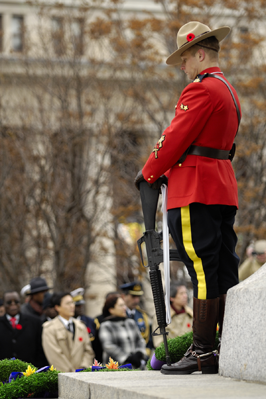
- The review of the Veterans Independence Program (VIP) will look at the evolution of the program since its inception in 1981 and will compare VIP services to those provided under provincial home care programs with the objective of identifying gaps and areas for improvement.
- The focus of the long-term care review will be on eligibility to the Department’s long-term care program, including access for Canadian Forces Veterans, and the average wait times to access long-term care once Veterans are found to be eligible.
- The review on mental health will collate all available statistical information on the approximately 16,000 former and current members of the Canadian Forces and the RCMP who have disability benefits for a mental health condition and provide an overview of departmental programming and spending to address their needs. This will form the basis for discussion with mental health professionals on programming gaps.
The Ombudsman released the first two of four reports on issues of procedural fairness.
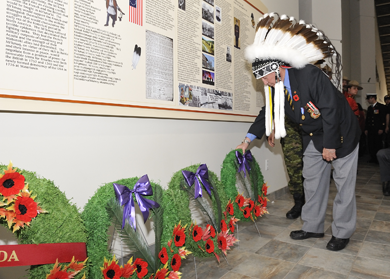
In his report entitled Veterans’ Right to Know Reasons for Decisions: A Matter of Procedural Fairness, the Ombudsman examined the adequacy of information provided by Veterans Affairs Canada in its decisions letters to Veterans who apply for disability pensions or disability awards.
In his report entitled Veterans’ Right to Fair Adjudication, the Ombudsman detailed the findings of the analysis of Federal Courts’ decisions pertaining to the Veterans Review and Appeal Board.
The Office will conduct follow-up reviews in fiscal year 2012–2013 to ensure that the changes made by Veterans Affairs Canada and the Veterans Review and Appeal Board in response to the Ombudsman’s recommendations fully address the shortcomings identified in the reports.
In addition, the Office will publish the last two reports on procedural fairness issues:
- The third report will look at the Department’s procedures to receive applications for disability pensions and disability awards and prepare documentation for adjudication. The purpose of the review will be to determine whether these procedures are procedurally fair and compliant with the legislation.
- The final report will be a comprehensive review of the entire process for disability pensions and disability awards, from the initial application stage to the point at which a decision is finally made on the claim. The purpose of this review will be to determine whether the administrative and management policies and procedures in place to deliver the disability benefits program are efficient, effective, and fair, and whether the program as a whole is achieving its stated objectives.
Appendix—Financial Report
The Veterans Ombudsman was granted a budget of $6.74 million for fiscal year 2011–2012 that was approved by the Treasury Board through the Minister of Veterans Affairs, of which $4.1 million was allocated to program and operational costs.
2011–2012 Treasury Board Funding
| Organization | Salary ($000) |
Operating ($000) |
Total Funding ($000) |
|---|---|---|---|
| Office of the Veterans Ombudsman | 2,750.0 | 1,306.3 | 4,056.3 |
| Public Works and Government Services Canada (accommodations) | 521.3 | - | 521.3 |
| Treasury Board (employee benefits) | 802.0 | - | 802.0 |
| Veterans Affairs Canada (provision of services to the Office) | 1,260.2 | 101.4 | 1,361.6 |
| Totals | 5,333.5 | 1,407.7 | 6,741.2 |
2011–2012 Office of the Veterans Ombudsman (OVO), Program and Operational Expenditures
| Program and Operational Requirements | Expenditures |
|---|---|
| Communications, advertising and outreach | 70,283 |
| Travel and Transportation | 161,408 |
| Professional and special services | 467,213 |
| Salaries and wages | 2,696,631 |
| Training and professional development | 45,276 |
| Telecommunications | 102,400 |
| Equipment, supplies, repairs and maintenance | 155,680 |
| Printing and publishing | 25,334 |
| Rentals | 12,500 |
| Miscellaneous | 2,107 |
| Total | $3,738,832 |
2011–2012 Veterans Affairs Canada, Program and Operational Expenditures for the Provision of Services to the OVO
| Program and Operational Requirements | Expenditures |
|---|---|
| Communications, advertising and outreach | - |
| Travel and Transportation | - |
| Professional and special services | - |
| Salaries and wages | 1,260,224 |
| Training and professional development | - |
| Telecommunications | 32,782 |
| Equipment, supplies, repairs and maintenance | 68,620 |
| Printing and publishing | - |
| Rentals | - |
| Miscellaneous | - |
| Total | $1,361,626 |
2011–2012 Summary of Expenditures
| Organization | Expenditures |
|---|---|
| Office of the Veterans Ombudsman | 3,738,832 |
| Veterans Affairs Canada (provision of services) | 1,361,626 |
| Public Works and Government Services Canada (accommodations) | 521,329 |
| Treasury Board (employee benefits) | 802,045 |
| Total Expenditures | $6,423,832 |
Canada's Veterans

Canadians have much to celebrate: freedom of speech, freedom of religion and peaceful assembly, social justice, democracy and the rule of law. These freedoms were hard won by Canadians willing to risk their lives to defend them. While the majority of serving men and women leave the service healthy, a great number of them return to civilian life ill or injured. As a nation, we have the obligation to take care of those who were put in harm’s way to protect our rights and freedom. Ensuring that their needs are met is the nation’s greatest and most meaningful expression of gratitude.
Photo Credits
Photograph of Guy Parent, Veterans Ombudsman, kaboom.ca
All other photographs, Department of National Defence
